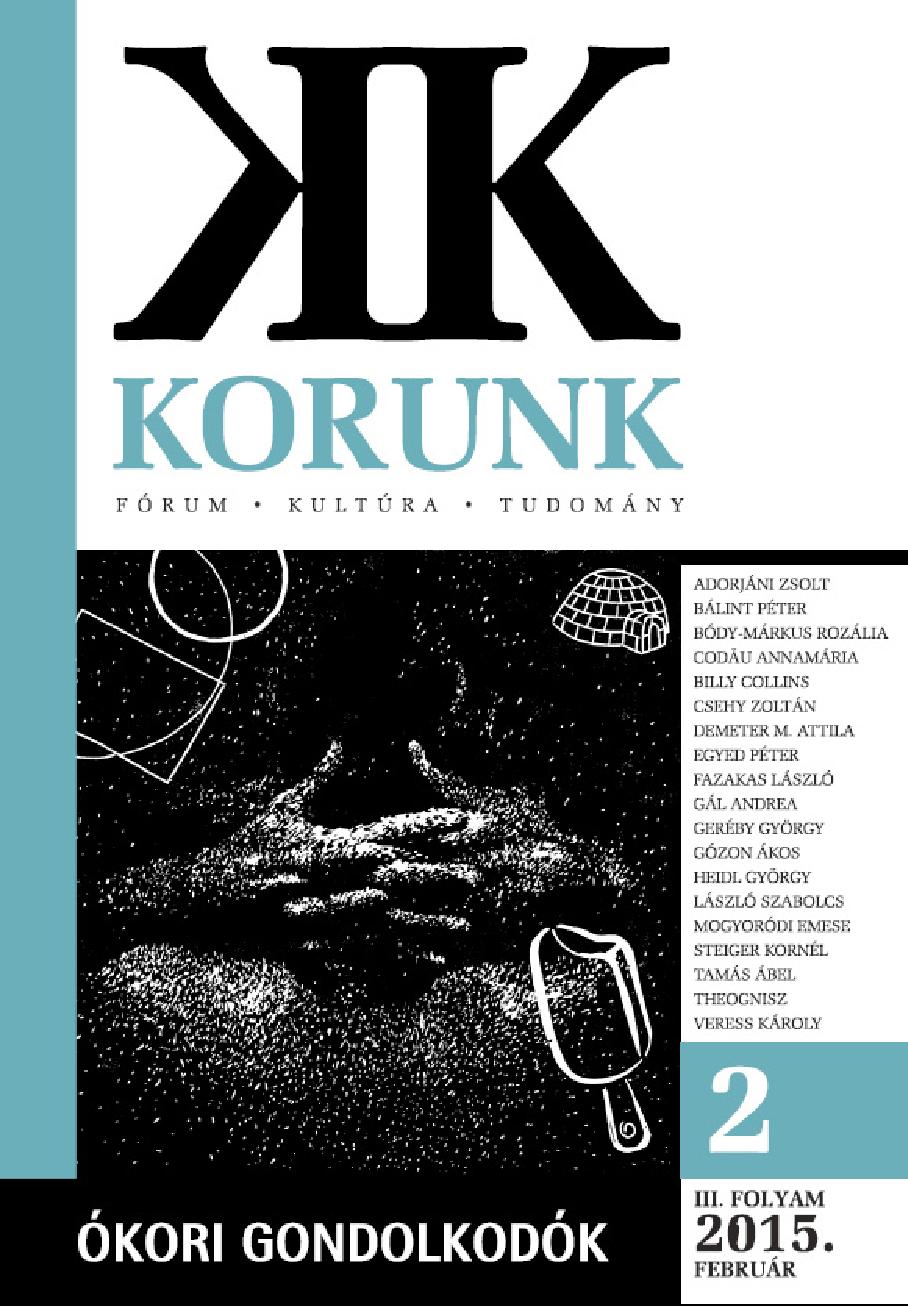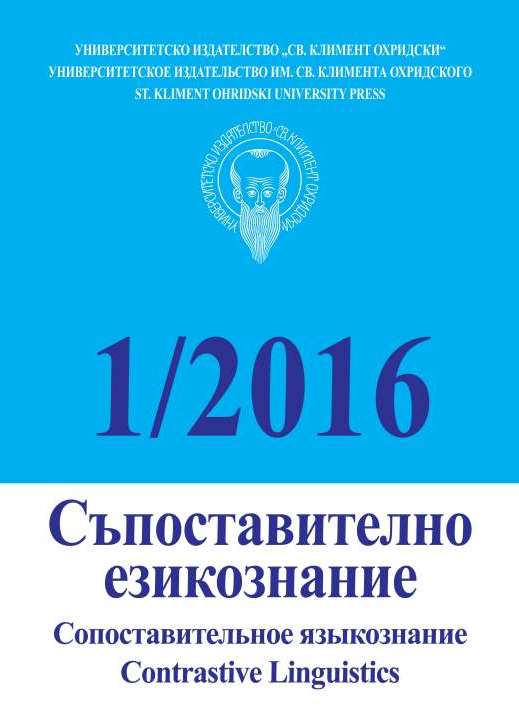







Keywords: ancient philosophy; contemporary music; Plato; Aristotle; Leonard Bernstein; John Cage; Casey Cangelosi; Stephen Melillo; Ian Wilson; Robert Maggio; Billy Collins
The study provides the special thematic treatment of the topic of ancient philosophy in modern and contemporary music. The author maps the traces of the influence of Plato’s Symposium and cave allegory in the works of Leonard Bernstein, John Cage, Casey Cangelosi, Stephen Melillo and Ian Wilson, examining the tension between the texts and the music score, between the interpretative gestures and the rituals of performance. The final part analyses the choral work Aristotle of Robert Maggio, inspired by Billy Collins’ ironic poem.
More...
Keywords: political thinking; republicanism; freedom; self-government
The essay highlights conclusions related to the nature and reason of freedom, which can be drawn from the tradition of republican thinking. Putting the question this way implies the presupposition that conclusions can be drawn from a tradition dating back to two thousand years ago. For this reason, the paper starts (and concludes) with some considerations related to the nature of political thinking. Unlike philosophical thinking in general, our political thinking is not a historical one by its nature. However, it is not purely unhistorical either, like mathematical thinking, for example. The political experiences accumulated in the course of time have been, of course, able to change the way we think about political matters, but our vision about the essence of politics has remained unchanged since the time of Ancient Greece. Turning now to the question of freedom: in this essay, I try to demonstrate that republicanism presents an ideal of freedom which radically differs from our perception of liberty and which, in consequence, can serve as a background for a “new utopia of liberty”. In our time, the dominant concept of freedom is based on the freedom of will. Freedom is usually regarded as a set of rights which aim to ensure citizens the almost unlimited possibility to choose their identity, their habits and ways of life. At the same time, citizens’ growing defencelessness against the state, as well as their increasing dependence on arbitrary social or political powers can also be observed. By contrast, for republican thinking, freedom has always meant – first and foremost – the lack of arbitrary power and, as a result, the capability and the possibility of self-government. The aim of republican thinking has always been to form citizens who are not subjected to anyone else’s will (and, of course, who do not want to dominate anyone else), instead of citizens who are helpless and defenceless – mostly in front of the state. It is an ideal which, I think, can be exemplary for all times – 0including ours.
More...

Keywords: National Casino of Cluj; Hungarian culture; social environment; board management; directorate corps
After the imperial change, a significant part of the Transylvanian Hungarian social institutions almost ceased to exist. In the beginning, even the most important associations could only receive a partial legal recognition. The National Casino of Cluj was one of the institutions which played an outstanding role in the spreading of Hungarian culture, in spite of the fact that the authorities monitored it strictly for two decades. Due to the directorate’s persistent work, they managed to create a pleasant and peaceful social environment inside the walls of the Casino. The main objective of this paper is to examine the affairs of the National Casino of Cluj between the world wars, the board management, and the directorate corps.
More...

Keywords: Hellenistic philosophy; Justin Martyr; Tryphon the Jew; theology
The encounter between the Christian philosopher Justin Martyr, of Samaritan background, and Tryphon the Jew (around 150 AD) offers essential pointers to understand more precisely what “Greek”, or rather Hellenistic, philosophy meant. First, Greek was not a nationality, but a culture, a langue axiale in which Greeks and non-Greeks could exchange and debate ideas. Again, as educated persons, they shared a literary canon (in artificial Greek) and methods of conceptualisation. Consequently, they shared a common framework in terms of the rationality of discussion, which also extended to theology. Rational theology was a legitimate branch of philosophy as the third theoretical discipline according to Aristotle. The inclusion of theology in philosophy shows that the ultimate subject for philosophy was not sterile speculation, or pure theory, but the principles which, in forms of practical syllogisms (Aristotle, NE 1144a 31-2), would lead to action, thereby answering the fundamental problem “how to live”. Greek philosophy was supposed to prepare a “way of life” (P. Hadot). More than that, it was not without reason that successive Roman emperors invited the advice of philosophy in the complexities of the imperial polity.
More...

Keywords: epitaph; love; Roman religion; Christianity; afterlife; personalism
The epitaphs of married couples often say that the conjugal love lasts even after death. However, this idea is very rarely associated with the faith in the immortality of the soul, and with the conviction that the deceased lovers will somehow live together in the afterlife. The epitaph of Paulina and her husband, Praetextatus is exceptional from this viewpoint. The poem represents the confession of a Roman pagan couple initiated into every possible mystery, and it can be taken as the witness of an early personalist approach.
More...


Keywords: moral philosophy; stoicism; precept; master; disciple; trauma; therapy
A favourite genre of ancient moral philosophy is the precept. It is addressed to the disciple by the philosopher-master. He calls the disciple to reflect upon such thoughts and to follow such forms of behaviour whose correctness and usefulness have been previously demonstrated. Quite many of the precepts of Marcus Aurelius, which he addressed to himself, are such that they are inconsistent both with the teachings of stoic moral philosophy and with the other precepts of the emperor. These “layman precepts” are characterised by lethargy, fear of death, and misanthropy, as if in a therapy the soul suffering from traumas were talking to itself in the voice of the therapist. In this paper I argue for the point that the layman precepts do not serve therapy but rather contain the diagnosis of the trauma: the emperor gives an account of his own mental disposition in need of the therapy of moral philosophy.
More...
Keywords: Catullus; cultural identity; homo novus; urbanus/urbanitas, rusticus/ rusticitas; Roman Republic
In this paper, I interpret Catullus’ poem 39 as reflecting to the instability of Roman identity. Characteristically, the Catullan persona uses the concept of urbanitas to attack someone else as rusticus or inurbanus, while the language of his argumentation destabilizes his own position. In the end, the bad habit of smirking everywhere, every time and in every situation attributed to Egnatius by the Catullan speaker emerges as a highly suitable answer – the answer of a sophisticated (i.e. urbanus) reader of the poem’s “Catullus” – to the Catullan attack which tries to stabilize a cultural position for himself (“I am urbanus and I know what it is”) which cannot be stabilized at all. In my interpretation, I read the Catullan poem as participating in the identity struggles of the late republican Rome.
More...
